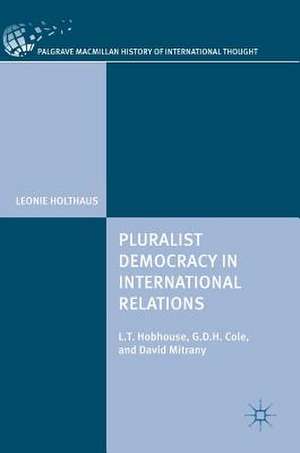Pluralist Democracy in International Relations: L.T. Hobhouse, G.D.H. Cole, and David Mitrany: The Palgrave Macmillan History of International Thought
Autor Leonie Holthausen Limba Engleză Hardback – 2 mar 2018
| Toate formatele și edițiile | Preț | Express |
|---|---|---|
| Paperback (1) | 717.85 lei 3-5 săpt. | |
| Springer International Publishing – 15 dec 2018 | 717.85 lei 3-5 săpt. | |
| Hardback (1) | 723.35 lei 6-8 săpt. | |
| Springer International Publishing – 2 mar 2018 | 723.35 lei 6-8 săpt. |
Din seria The Palgrave Macmillan History of International Thought
-
 Preț: 384.70 lei
Preț: 384.70 lei -
 Preț: 383.71 lei
Preț: 383.71 lei -
 Preț: 389.11 lei
Preț: 389.11 lei -
 Preț: 385.62 lei
Preț: 385.62 lei -
 Preț: 383.71 lei
Preț: 383.71 lei -
 Preț: 386.61 lei
Preț: 386.61 lei - 15%
 Preț: 640.24 lei
Preț: 640.24 lei - 15%
 Preț: 640.06 lei
Preț: 640.06 lei -
 Preț: 389.70 lei
Preț: 389.70 lei -
 Preț: 394.87 lei
Preț: 394.87 lei -
 Preț: 388.52 lei
Preț: 388.52 lei -
 Preț: 381.98 lei
Preț: 381.98 lei - 18%
 Preț: 724.63 lei
Preț: 724.63 lei -
 Preț: 383.50 lei
Preț: 383.50 lei - 15%
 Preț: 640.88 lei
Preț: 640.88 lei -
 Preț: 383.50 lei
Preț: 383.50 lei - 15%
 Preț: 639.59 lei
Preț: 639.59 lei - 15%
 Preț: 640.71 lei
Preț: 640.71 lei - 18%
 Preț: 733.03 lei
Preț: 733.03 lei - 18%
 Preț: 727.48 lei
Preț: 727.48 lei -
 Preț: 417.90 lei
Preț: 417.90 lei - 15%
 Preț: 692.56 lei
Preț: 692.56 lei - 15%
 Preț: 690.11 lei
Preț: 690.11 lei -
 Preț: 391.61 lei
Preț: 391.61 lei - 15%
 Preț: 640.06 lei
Preț: 640.06 lei -
 Preț: 386.00 lei
Preț: 386.00 lei -
 Preț: 386.61 lei
Preț: 386.61 lei -
 Preț: 383.12 lei
Preț: 383.12 lei -
 Preț: 386.81 lei
Preț: 386.81 lei
Preț: 723.35 lei
Preț vechi: 882.13 lei
-18% Nou
Puncte Express: 1085
Preț estimativ în valută:
138.42€ • 143.02$ • 115.15£
138.42€ • 143.02$ • 115.15£
Carte tipărită la comandă
Livrare economică 19 martie-02 aprilie
Preluare comenzi: 021 569.72.76
Specificații
ISBN-13: 9783319704210
ISBN-10: 3319704214
Pagini: 270
Ilustrații: XI, 257 p.
Dimensiuni: 148 x 210 mm
Greutate: 0.48 kg
Ediția:1st ed. 2018
Editura: Springer International Publishing
Colecția Palgrave Macmillan
Seria The Palgrave Macmillan History of International Thought
Locul publicării:Cham, Switzerland
ISBN-10: 3319704214
Pagini: 270
Ilustrații: XI, 257 p.
Dimensiuni: 148 x 210 mm
Greutate: 0.48 kg
Ediția:1st ed. 2018
Editura: Springer International Publishing
Colecția Palgrave Macmillan
Seria The Palgrave Macmillan History of International Thought
Locul publicării:Cham, Switzerland
Cuprins
1. Introduction.- 2. The Nineteenth Century and the Origins of Modern Democracy.- 3. L.T. Hobhouse’s Qualification of the Democratic Peace Thesis.- 4. Nationalism, Liberal Democracy, and the Prospects for International Cooperation.- 5. G.D.H. Cole’s Wars: At the Homefront.- 6. Narratives of Democratic Decline and Reconstruction.- 7. David Mitrany and the Purposes of Functional Pluralism.- 8. Twentieth-Century Representative Democracy and the Democratic Legitimacy of the United Nations.- 9. Conclusion.
Notă biografică
Leonie Holthaus is Senior Research Fellow at TU Darmstadt, Germany, and the Cluster of Excellence “The Formation of Normative Orders” at Frankfurt University, Germany. Her articles have appeared in the European Journal of International Relations, the Review of International Studies, and the International History Review.
Textul de pe ultima copertă
This book demonstrates the importance of democracy for understanding modern international relations and recovers the pluralist tradition of L.T. Hobhouse, G.D.H. Cole, and David Mitrany. It shows that pluralism’s typical interest in civil society, trade unionism, and transnationalism evolved as part of a wide-ranging democratic critique that representative democracies are hardly self-sustaining and are ill-equipped to represent all entitled social and political interests in international relations. Pluralist democratic peace theory advocates transnational loyalties to check nationalist sentiments and demands the functional representation of social and economic interests in international organizations. On the basis of the pluralist tradition, the book shows that theories about domestic democracy and international organizations co-evolved before scientific liberal democratic peace theory introduced new inside/outside distinctions.
Caracteristici
Presents an intervention into three current academic debates in the fields of IR historiography, transnational democracy, and political theory. Offers chronological scrutiny of pluralist accounts of democratic and international changes. Utilizes source material from four British archives.
